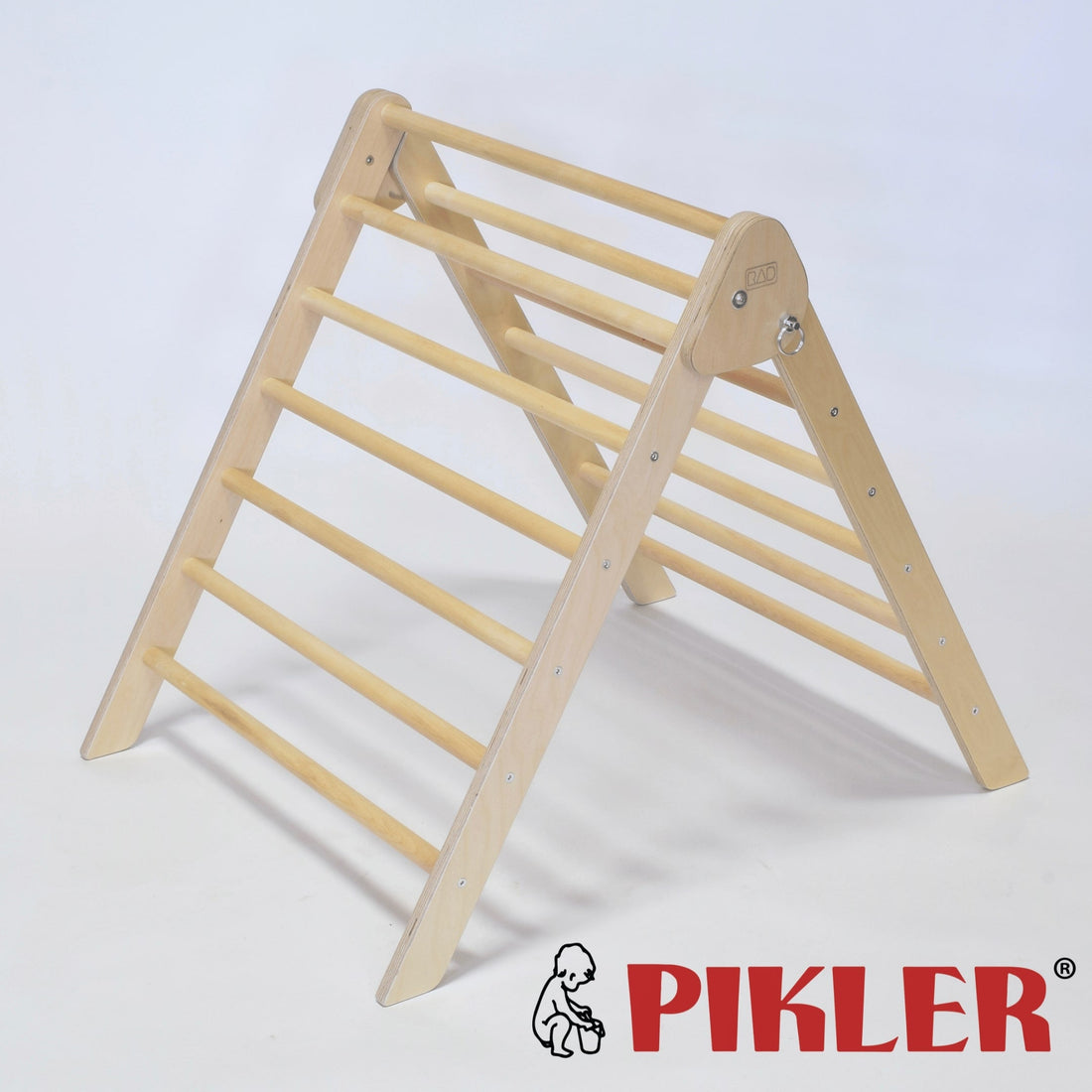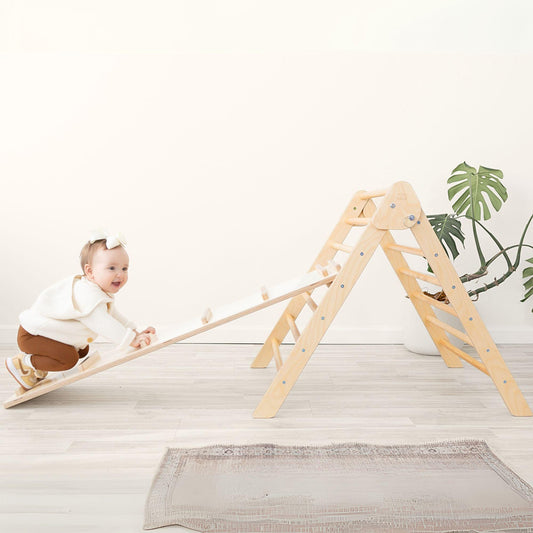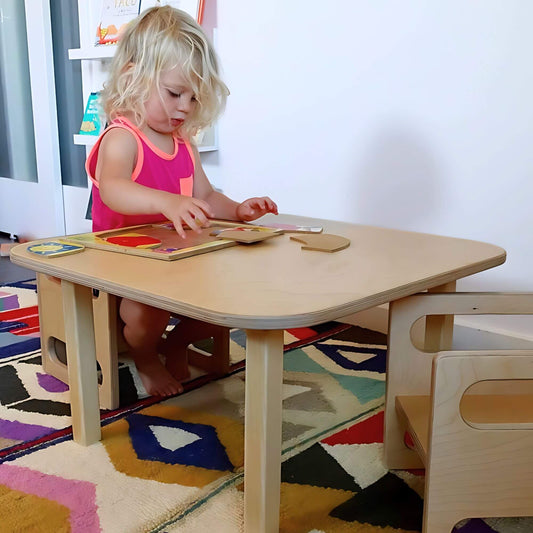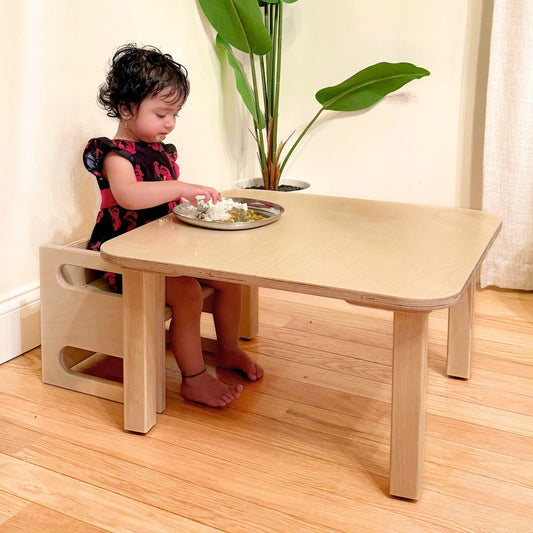
RAD Children's Furniture offers the first official Pikler® Triangle in the United States
Share
How do we instill competence in the very young? This is Dr. Emmi Pikler's leading question that has inspired us for a long time. Since our humble beginnings, when RAD Children's Furniture started as a resource of wooden furniture for infants and toddlers to the parents and educators in the U.S., it was only a natural progression that RAD would begin creating instruments based on the Dr. Pikler's work.
In 2004, RAD was commissioned to build the first Pikler-style climbing triangle in the United States. We are extremely pleased to announce that we have again passed another first. After years of going through the certification process - proving that the integrity of our company, the meticulousness of our work and the materials we use are of the highest standards and quality - the Pikler House in Budapest, Hungary has officially recognized our climbing triangle to be the first climbing triangle in the Western Hemisphere worthy of the Pikler Triangle name. Being granted a license to use the Pikler® name is a big milestone for our small company; it validates our vision, integrity and commitment to children's development and to their parents and educators.
“This recognition from a 75-year-old institution, which has contributed so much to children, means the world to us,” says Radomir Samardzic, RAD founder.
"With the rise of climbing triangles on the market it has become increasingly important for us to become Pikler® certified to make sure that our Pikler Triangles adhere to the original pedagogical guidelines of the Pikler House,” states RAD partner, John Poortinga.
* * *
Dr. Emmi Pikler was born in 1902 and grew up in Vienna and Budapest; she was a true visionary. While studying pediatrics at the University Children’s Hospital in Vienna in the 1920s, Dr Pikler became fascinated with the physiology of gross motor development. She observed the differences between children who were neither restricted nor taught in their gross motor development and those who were assisted, propped, sat, and walked. Dr Pikler found that the children of wealthy families were more likely to fall and suffer fractures since they were overprotected and their movements limited. Children in underserved communities, however, were allowed to roam, run and play at will. Her premise was that freedom of movement also influences other areas of growth: social, emotional, cognitive, and personality.
In 1946 the Hungarian government asked Dr Pikler, as a well-known and respected family pediatrician, to open a residential nursery, known as Lóczy, named after the street address, in Budapest to care for the many orphaned and abandoned children after the Second World War. Dr. Pikler remained the director of Lóczy until her death in 1984 during which time more than 2,000 children flourished under her care. Over the years, studies were conducted on hundreds of the children raised at Lóczy and an independent follow-up study funded by the World Health Organization (WHO) documented how the children adapted to family life after adoption. Lóczy was subsequently renamed the Pikler Institute, and while it continues to operate to this day, its role as a residential nursery ended in 2011.
Dr. Pikler was quoted saying that “World peace starts on the changing table.” And we would add that: “Freedom starts at the Pikler Triangle.”
* * *
The Pikler pedagogy is a unique early childhood approach developed by the pediatrician Emmi Pikler and her followers. The Pikler approach is based on a kind and respectful relationship between an adult and infant, through tender care moments, a naturally paced motor development, free movement and uninterrupted play.
* * *
The Pikler House continues to be the 'headquarters' for Emmi Pikler’s work today. In their institution, the pedagogical practice of the Pikler approach is currently implemented in the continuous cooperation of the in-house nursery, pedagogical workshop and methodological training. It is home to highly skilled professionals who not only deliver Pikler Training, but also train trainers. Since Pikler’s death in 1984 the they have diligently carried Pikler’s work on and forward, keeping the core of her approach intact.
People from all corners have been drawn to Pikler’s work, many have trained at Pikler and official Pikler organisations have sprung up around the world, making her approach available to many more.
Emmi Pikler’s approach continues to inspire people, from day-care, early childhood education, and families - across cultures, countries and languages. Those who have grasped and applied Pikler’s ideas find peaceful and cooperative working relationships with children, extremely low illness reports in care facilities, harmonious family life, healthy and thriving children, and their own personal growth.
For more on the Pikler House please visit: www.pikler.hu
For information on Pikler-Lóczy USA please visit: www.pikler.org

















 Off
Off
